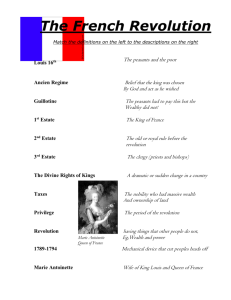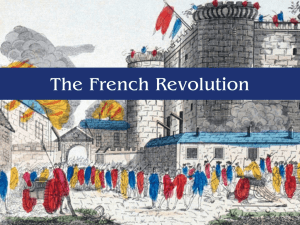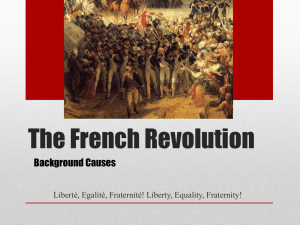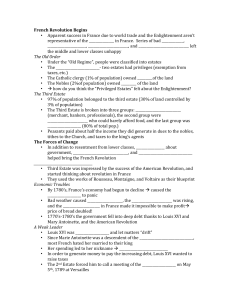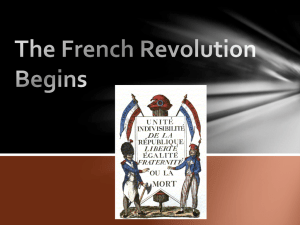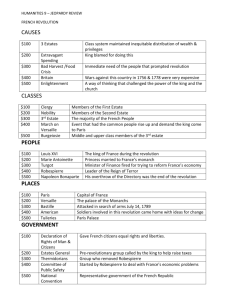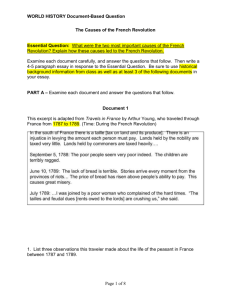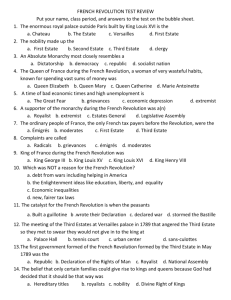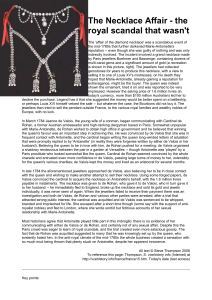Revolution in France - White Plains Public Schools
advertisement
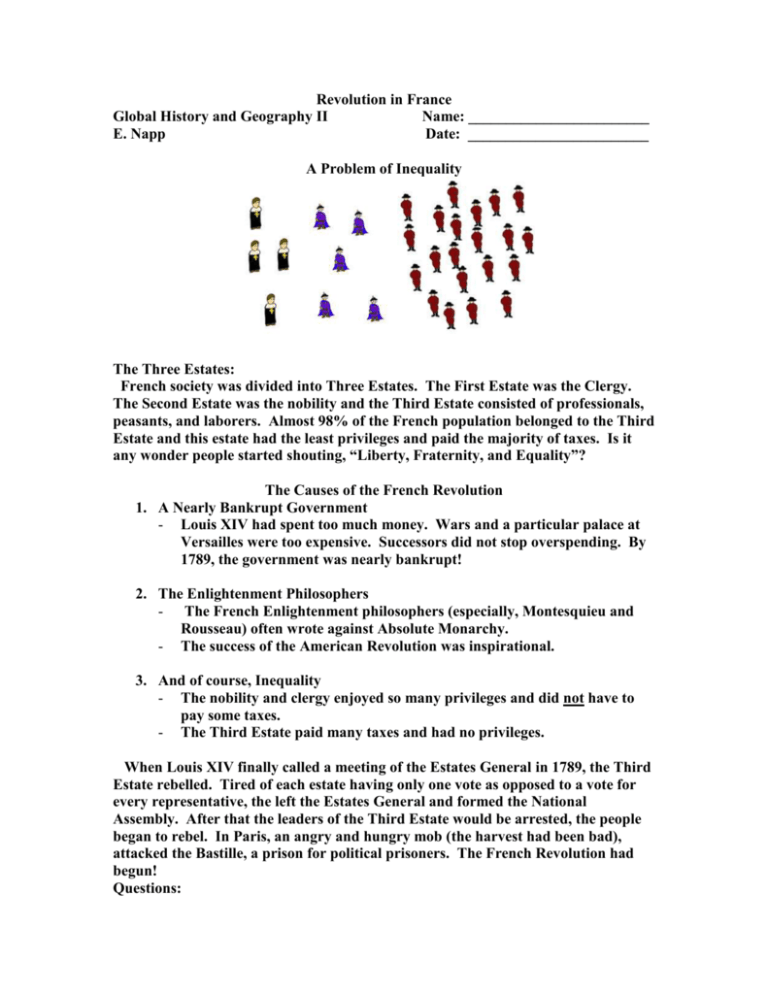
Revolution in France Global History and Geography II Name: ________________________ E. Napp Date: ________________________ A Problem of Inequality The Three Estates: French society was divided into Three Estates. The First Estate was the Clergy. The Second Estate was the nobility and the Third Estate consisted of professionals, peasants, and laborers. Almost 98% of the French population belonged to the Third Estate and this estate had the least privileges and paid the majority of taxes. Is it any wonder people started shouting, “Liberty, Fraternity, and Equality”? The Causes of the French Revolution 1. A Nearly Bankrupt Government - Louis XIV had spent too much money. Wars and a particular palace at Versailles were too expensive. Successors did not stop overspending. By 1789, the government was nearly bankrupt! 2. The Enlightenment Philosophers - The French Enlightenment philosophers (especially, Montesquieu and Rousseau) often wrote against Absolute Monarchy. - The success of the American Revolution was inspirational. 3. And of course, Inequality - The nobility and clergy enjoyed so many privileges and did not have to pay some taxes. - The Third Estate paid many taxes and had no privileges. When Louis XIV finally called a meeting of the Estates General in 1789, the Third Estate rebelled. Tired of each estate having only one vote as opposed to a vote for every representative, the left the Estates General and formed the National Assembly. After that the leaders of the Third Estate would be arrested, the people began to rebel. In Paris, an angry and hungry mob (the harvest had been bad), attacked the Bastille, a prison for political prisoners. The French Revolution had begun! Questions: 1- Why did inequality exist in France? _______________________________________________________________ _______________________________________________________________ 2- How did the Enlightenment and the American Revolution affect the French people? _______________________________________________________________ _______________________________________________________________ 3- Why was the government nearly bankrupt? _______________________________________________________________ _______________________________________________________________ 4- What happened in 1789? _______________________________________________________________ _______________________________________________________________ The following cartoon was adapted from schoolhistory.uk Label the Three Estates: Explain the meaning of the cartoon: ________________________________________________________________________ ________________________________________________________________________ From the Regents: A study of revolutions would most likely lead to the conclusion that a preRevolutionary government 1. 2. 3. 4. is more concerned about human rights than the government that replaces it refuses to modernize its armed forces with advanced technology attempts to bring about the separation of government from religion fails to meet the political and economic needs of its people A Primary Source: Arthur Young Travels in France (1792) J.H. Robinson, ed., Readings in European History 2 vols. (Boston: Ginn, 1906), 2:365, 373-378, 402-404 Robinson's Note: Of all the descriptions that we have of the general condition of the French people upon the eve of the Revolution, the most important and interesting is Arthur Young's account of his travels in France during the years 1787, 1788, and 1789. Young was an honest and observant English gentleman farmer, whose aim was to ascertain "the cultivation, wealth, resources, and national prosperity" of France, which were, as he foresaw, to be fundamentally changed by the Revolution then under way. “Walking up a long hill…, I was joined by a poor woman, who complained of the times, and that it was a sad country…she said her husband had but a morsel of land, one cow, and a poor little horse, yet they had a franchar (forty-two pounds) of wheat and three chickens to pay…to one seigneur (lord); and four franchar of oats, one chicken, and one franc, to pay to another, besides very heavy tailles (taxes) and other taxes. She had seven children, and the cow's milk helped to make the soup. But why, instead of a horse, do not you not keep another cow? Oh, her husband could not carry his produce so well without a horse...It was said, at present, that something was to be done by some great folks for such poor ones… “This woman, at no great distance, might have been taken for sixty or seventy, her figure was so bent and her face so furrowed and hardened by labor, but she said she was only twenty-eight. An Englishman who has not traveled cannot imagine the figure made by infinitely the greater part of the country women in France; it speaks, at the first sight, hard and severe labor. I am inclined to think that they work harder than the men, and this, united with the more miserable labor of bringing a new race of slaves into the world, destroys absolutely all symmetry of person and every feminine appearance. To what are we to attribute these differences, in the manners of the lower people in the two kingdoms? To government…” Questions: 1. Who was Arthur Young and why did he travel in France? _______________________________________________________________ _______________________________________________________________ 2. Describe the woman Young met? _______________________________________________________________ _______________________________________________________________ 3. Why was her life so difficult? _______________________________________________________________ _______________________________________________________________ 4. How does this primary source explain one of the most significant causes of the French Revolution? _______________________________________________________________ _______________________________________________________________ "Arrest of Louis Capet at Varennes, June 22, 1791" This print shows an angry crowd of fervent revolutionaries breaking down doors to arrest the King. (Source: Museum of the French Revolution L84.264) Of course, when a revolution begins, the years of oppression and injustice give can give rise to extreme violence and anger. Why were the people of France upset with their king? 1. _____________________________________________________________ 2. _____________________________________________________________ 3. _____________________________________________________________ From pbs.org “Louis XVI reluctantly agreed to much of the revolutionaries' agenda, hoping in this way to retain his throne in a constitutional monarchy, not unlike that of England across the Channel. But over time, the Revolution became more militant and the King, urged on by the Queen and her family in Austria, less accommodating. Eventually the King, who was known, formally simply as "France," was at odds with that other France, the citizens and their representatives. Once France was declared a republic in 1792, "France" had lost all claims to represent the people whose will he had embodied for the previous 18 years.” Questions: 1. Why did Louis XVI accept much of the revolutionaries’ agenda? ______________________________________________________________ 2. What did Louis XVI expect to happen after he accepted the revolutionaries’ agenda? _______________________________________________________________ 3. Why did the King begin to change his mind? _______________________________________________________________ 4. What was the King known as? _______________________________________________________________ 5. Why and when did he lose all claims to represent the people? _______________________________________________________________ Excerpt from thecaveonline.com/APEH/ “The Queen of France was bored. Try as she might, Marie Antoinette (1755-93) found insufficient diversion (entertainment) in her life at the great court of Versailles. When she was fourteen, she had married the heir to the French throne, the future Louis XVI. By the age of nineteen, she was queen of the most prosperous state in continental Europe. Still, she was bored. Her life, she complained to her mother, Empress Maria Theresa of Austria, was futile and meaningless. Maria Theresa advised the unhappy queen to suffer in silence or risk unpleasant consequences. Sometimes mothers know best. As head of the Habsburg Empire, Maria Theresa understood more about politics than her youngest child. She understood that people have little sympathy with the boredom of a monarch, especially a foreign-born queen. But Marie Antoinette chose to ignore maternal advice and pursued amusements and intrigues that had unpleasant consequences indeed. This Austrian-born queen may not have been shallower or more wastefully extravagant than other queens, but it mattered that people came to see her that way. The queen's reputation sank to its nadir (lowest point) when it was reported that she dismissed the suffering of her starving subjects with the haughty retort "Let them eat cake." What better evidence could there be of the queen's insensitivity than this heartless remark? Marie Antoinette never said "Let them eat cake," but everyone thought she did. This was the kind of callousness that people expected from the monarchy in 1789. Marie Antoinette understood the plight of her starving subjects, as her correspondence indicates. Probably a courtier at Versailles was the real source of the brutal retort, but the truth did not matter.” Questions: 1. Who was Marie Antoinette? _______________________________________________________________ 2. Why was she bored? _______________________________________________________________ 3. What was her mother’s advice? _______________________________________________________________ 4. What was she reported as saying? _______________________________________________________________ 5. Although she did not say these words, the public viewed her as being insensitive. How did the public interpret her words? _______________________________________________________________ Excerpt from chnm.gmu.edu “Bread was the basic staple of most people’s diets, and variations in the price of bread were keenly felt by the poor, especially by women who most frequently bought bread in the marketplace. Women would sometimes protest against what they thought to be unjust price increases for bread in what were known as "bread riots." As this excerpt shows, these were not usually violent, nor did they involve looting, but instead were a collective action designed to force bakers to sell bread at a "just" or "moral" price rather than at whatever price the market would allow. This passage is taken from a well–known chronicle of the reign of Louis XV by Etienne–Joseph Barbier. (17 July 1725)—On Saturday the fourteenth, a baker …tried to sell bread for thirty-four sous which that morning had cost thirty. The woman to whom this happened caused an uproar and called her neighbors. The people gathered, furious with bakers in general. Soon their numbers reached eighteen hundred, and they looted all the bakers' houses … from top to bottom, throwing dough and flour into th e gutter.” Question: 1. Why was bread so important? ________________________________________________________ 2. What was a bread riot? ________________________________________________________ 3. According to the primary source, why were the women furious? ________________________________________________________ 4. What did the women do? ________________________________________________________ 5. What did the women hope their actions would lead to? ________ ________ ________ ________ ________ ________ ________
